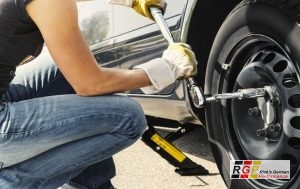
Preparing Your Vehicle for the Frigid Conditions of Winter is a Must, Especially for Travelers.
What should you do to winterize your car? This is a question we hear every year as cold weather starts to settle in. While California may be light on snow, there’s no shortage of potential problems on the road during frigid weather. For the prepared, there’s little reason to worry. For those who set out into the winter season without any contingency planning, disaster could be one sharp turn away. Today we’ll talk about winter car maintenance, protecting your vehicle in cold weather, and preparing that oh-so-important winter emergency car kit.
How Do I Take Care of My Car in the Winter?
Start with the little things! Warming up your car in winter weather is one of easiest, yet essential practices you need to adopt this season, especially if your vehicle is an older model. Running your engine for a few minutes before driving allows your carburetor heat up and properly vaporize fuel. Your engine should run more efficiently as a result. If your car needs to handle any sort of steep incline or breakaway acceleration within the first few minutes of ignition, at least give your vehicle two minutes to warm up.
Next comes the oil check! Remove the dipstick from the oil pan and wipe it off with a paper towel. Then reinsert it into your oil reserve and check the color. Lighter brown oil is perfectly fine, but black icky oil means you need to replace it (or have a pro do it for you).
Are your wiper blades worn down? Protect your vehicle and yourself by installing a fresh set of blades whenever the old ones don’t cut it anymore. If you need to park outside overnight, you can protect your blades from freezing to the windshield by leaving them up (like you’re replacing them).
Car Maintenance Checklist for Winter
One of the common misconceptions we’ve encountered is that the cold temperatures makes it okay to ignore certain maintenance requirements. To prepare your car for winter, maintenance is a must! We’ve already talked about some of the habits you can adopt to protect your vehicle, but these next steps are essential.
Tire Check

Checking Your Tires on a Regular Basis Will Help You Prevent a Roadside Emergency.
First of all, don’t forget to check those tires! Be on the lookout for bulges or cuts in the sidewalls, as these could indicate your tire are close to failing. Use the penny test to examine the treading. If you’ve never heard of it, insert a penny (head first) into the treading of each tire. Should Abraham Lincoln’s head disappear, your tread is alright. When Lincoln is completely visible however, you need to replace the tire.
Many drivers don’t realize this, but tires actually expire six years after their manufacturing date. “Big deal!” you might think. Ya, it is a big deal. Expired tires a many times more likely to spontaneously fail, and we all know what happens when tires give out on a busy highway. That’s why you should always check the expiration date when you buy a new set of tires!
Battery Test
Batteries can’t give out as much juice in cold weather. According to Consumer Reports, “…at about 0° F, a battery has only about half the cranking power it has at 80° F.” If you find yourself in a rough driving situation, you’ll want all the power you can get! Take a look at your battery’s owner guide and check the steps for testing your battery. You don’t necessary have to replace your DieHard car battery immediately, but it may be prudent to have your local service recharge it for you. A little basic car battery maintenance in winter can save you from a frustrating tow off the highway.
Watch Your Fluid Levels
Can my car overheat in winter? When your engine spins into action, it’s going to heat up just like it would any other time of the year. That means you need to make sure your coolant, antifreeze, and oil levels are where they need to be, and that they “check engine” light is off. Coolant circulates throughout your engine, absorbing heat and facilitating continuous operation. Oil prevents interlocking parts from generating too much friction as they move back and forth.
Of course, there’s all the other fluids to look after, such as your power steering, antifreeze (very important in winter), wiper fluid, etc. If you need help checking these levels, consult your car manual or talk with your local mechanic.
What Should I Keep in My Car for Winter?
There are certain items you should always keep in your car all year round, and the winter season is no exception. These include a phone charger, signal booster (if you frequently go on long road trips), spare tire, lug wrench, car jack, jumper cables, flashlight, and first aid kit. Those are just the basics. For winter travel, you’ll need to include a handful of additional safety items.
Prep Your Winter Emergency Car Kit

Even if You Live in a State With Mild Winters, Basic Preparations Could Save Your Life!
The California Highway Patrol kindly compiled a list of items to include in your crisis kit. These include:
- A Blanket
- Small Took Kit
- Nylon Rope
- Duct Tape
- Plastic Tarp
- Vehicle Fuses
- Bottled Water
- Energy Bars
- A “Help” Sign
- and Rags
You should definitely add an ice scraper to your list, so that you can clear off your windshield before you set out in the morning. Pack a rain poncho to help you stay dry in the rain, and a pocketknife for general use. A spare set of basic winter clothes is also a prudent addition to your emergency kit. Few people find themselves in a life-threatening crisis on the road, but it always pays to be prepared. Consult your local government’s travel advisory page and make sure you examine the weather predictions during your trip.
Make sure you keep up to date on your winter car maintenance! If you or a loved one requires vehicle service before the cold weather hits, our team at German Performance would love to help you.
Give us a call today at (805) 466-3236.
